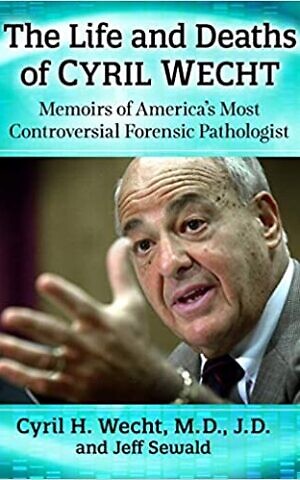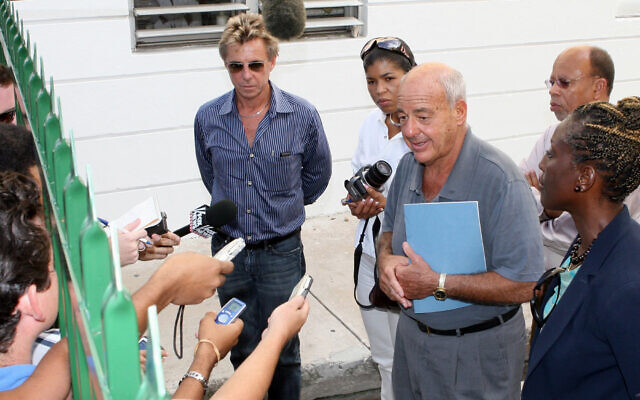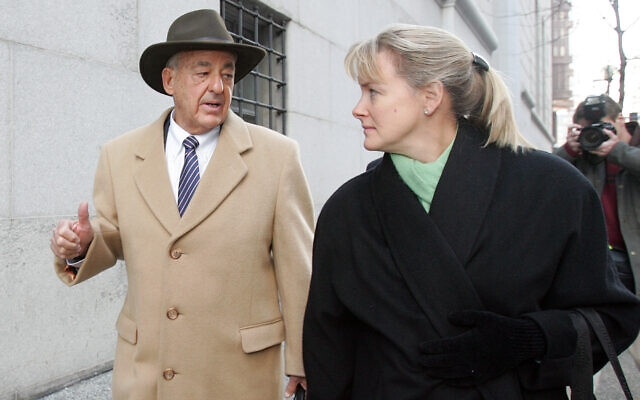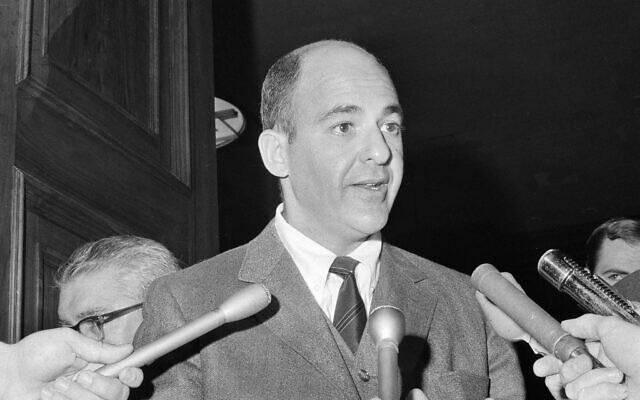PITTSBURGH JEWISH CHRONICLE — After penning eight true crime books and writing or contributing to dozens of professional books, internationally acclaimed forensic pathologist Dr. Cyril Wecht has written perhaps his most captivating book to date: a memoir of his own life.
In “The Life and Deaths of Cyril Wecht: Memoirs of America’s Most Controversial Forensic Pathologist,” Wecht, now 89, chronicles his life from his humble beginnings as the son of a merchant in Bobtown, Pennsylvania, to his childhood in Pittsburgh, military service, meeting his wife, as well as his eventual rise to Allegheny County coroner, his past legal troubles, the deep love and commitment he has for his family, and a snapshot of some of the cases that defined his illustrious career.
Those who only know Wecht from what they’ve read in the newspapers or have seen on television may be surprised by the outspoken coroner, who regales his audience with stories that could equally curl your toes and warm your heart.

In this July 16, 2009 photo Dr. Cyril Wecht pauses as he records notes during an autopsy in Pittsburgh. (AP Photo/Keith Srakocic)
Wecht details his fascinating, multifaceted life in a straightforward, no-nonsense way, with fervor and self-assurance, but with underlying warmth and even a touch of humor.

‘The Life and Deaths of Cyril Wecht: Memoirs of America’s Most Controversial Forensic Pathologist,’ by Cyril Wecht. (Courtesy)
Wecht’s dual legal and medical degree have elevated his professional life; he has been called upon to perform autopsies and/or testify, applying complex medical-legal principles, in cases extending from Pittsburgh to Pakistan to Brazil, Australia, China and many more countries, as well as across the US.
Though Wecht runs on a schedule that would be exhausting for someone decades younger, he is tireless. In part, he is compelled to keep going by a sense of justice. He makes it clear in the book that the cases he works on are equally important, whether it is a high-profile sensationalized case, such as Chandra Levy, David Koresh or Claus von Bülow, or a coal miner whose family is seeking Black Lung benefits or a young African American man shot by a white police officer.
“When I became coroner in 1970, every police-related death was a matter of public inquest conducted by my office,” Wecht said in a phone interview. “I became heavily involved in Jonny Gammage and Charles Dixon and cases of African Americans brutalized by the cops. I am very proud of that.”

Pathologist Cyril Wecht, center, talks to the media while Bahamas’ head coroner Linda Virgil, right, and attorney Michael Scott, left, listen, outside the Rand Laboratory morgue at the Princess Margaret Hospital in Nassau, Bahamas, September 17, 2006. (AP Photo/Tim Aylen)
He paid a steep price for these coroner inquests, however, as they ignited a longstanding feud with Allegheny County District Attorney Stephen Zappala. Wecht lost millions of dollars while defending what he describes as trumped up corruption charges against him, which he says were motivated by politics. In the book, he details the federal charges brought about by former US Attorney Mary Beth Buchanan.
Fully exonerated though financially ruined, Wecht is clearly still angry about those charges, as well as litigation against him in the late 1970s, in which he was also cleared.

Former Allegheny county coroner turned celebrity pathologist Cyril Wecht talks with his daughter in-law Anna Wecht as they leave the Federal courthouse in Pittsburgh, January 28, 2008. (AP Photo/Don Wright)
In addition to leaving his story behind for his cherished family, Wecht wanted to write this book, he said, so readers could understand the “ … complexity and the multifaceted challenges of the interface of law and medicine, specifically in the realm of pathology, and how important it is for justice to be served, with the input from forensic science, and how the system can be subverted, perverted, suppressed, and manipulated.”
In addition to his early life, Wecht also devotes parts of the book to his interest in public office; the establishment of the Cyril H. Wecht Institute of Forensic Science and Law at Duquesne University; and the many cases, famous and not so famous, he has worked on during his career.

In this July 16, 2009 photo, Dr.Cyril Wecht slices sections of a brain during an autopsy at the facility he uses in Pittsburgh. He brings to the task, as to all things, an eccentric flair that has made him one of the most sought-after pathologists, one who played a part in many famous cases, a man whose personality helped turn a grim profession into a popular career choice and helped birth a generation of fictional medical examiners on crime shows from ‘CSI’ to ‘NCIS.’ (AP Photo/Keith Srakocic)
Interwoven throughout the memoir are comments from friends, family and colleagues, including close friend and journalist Geraldo Rivera, former Pennsylvania Gov. Dick Thornburgh and criminal defense attorney F. Lee Bailey. Photos of Wecht from childhood to present day — such as a photo of Wecht and his varsity basketball team at Fifth Avenue High School or one of him with director Oliver Stone — add color to the book.
No Cyril Wecht memoir would be complete without his analysis of the case that continues to vex him: the assassination of president John F. Kennedy. Wecht writes in detail about his involvement in the case and how he debunked the single bullet theory as outlined in the Warren Report, as well as his belief that the government or at least people connected with the government, had a role in the president’s death.
Although filled with both personal and professional stories of a life well lived and a career that has launched Wecht into the national spotlight, the book can also be viewed as a cautionary tale.

Dr. Cyril Wecht tells a Washington news conference that the Rockefeller CIA Commission report on his findings in the John F. Kennedy assassination case have been distorted, June 12, 1975. (AP Photo/Charles Bennett)
“We believe we live in this great, honorable society and terrible things cannot happen; that is so naïve and so absurd,” said Wecht.
Still, his sense of justice and compulsion to advocate for the voiceless come through loud and clear in the pages.
As Wecht himself writes in the preface: “In the end, I believe that one does what one must, as determined by the internal compass of one’s being — what the mind and heart require.”

Dr. Cyril Wecht of Pittsburgh, a witness during the hearings to exhume the body of Mary Jo Kopechne, who testified that in his opinion the body should be exhumed, talks to newsmen at Wilkes-Barre, Pennsylvania, October 21, 1969.(AP Photo/Paul Vathis)
 RSS Feed
RSS Feed















 December 5th, 2020
December 5th, 2020  Awake Goy
Awake Goy  Posted in
Posted in  Tags:
Tags: 













